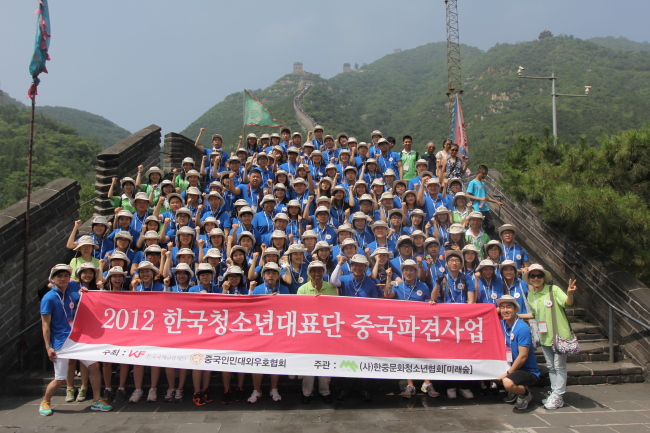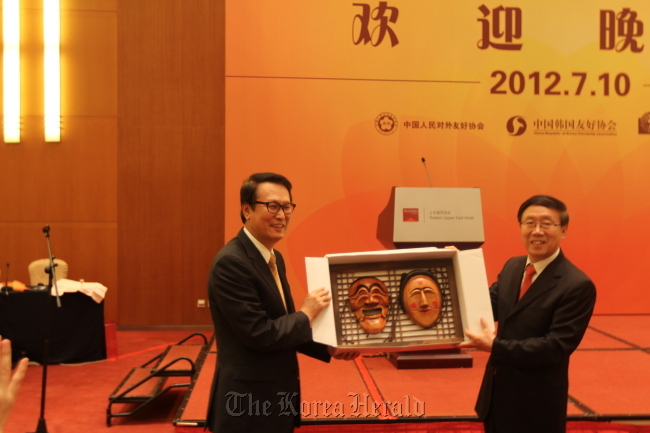‘학생 교류 프로그램 한-중 관계이해 도와'
한국국제교류재단 한-중 수교 20주년 기념, 대규모 학생단 중국 파견
 |
'한국청년대표단' 단원들이 만리장성에 올라 기념촬영을 하고 있다. |
 |
신정승 단장(왼쪽)이 환영만찬에서 중국인민대외우호협회 관계자에게 한국의 하회탈을 기념품으로 전달하고 있다. |
오규욱 기자
(코리아 헤럴드)
<영문 기사>
Youth exchange program promotes Korean-Chinese understanding
BEIJING ― Twenty-one-year-old Lee Sang-rok harbored prejudice against Chinese like many of his colleagues, conscious of the checkered history between the two countries and its ascent to a global power. A trip as part of a youth exchange program changed his attitude.
“I thought the people were very unfriendly and very self-centered. But they are a lot like us, and now I think we are just the same as Asians,” he said.
He is one of more than 100 students visiting China this week in the program organized by the Korea Foundation.
Korea agreed with China to expand exchange programs during a bilateral summit in 2008. And since 2009, the state-run agency has been sending students to China every year with the aim of strengthening the bilateral relationship.
This year a total of 111 students, including 85 undergraduate and postgraduate students, and 16 high-school students from multicultural families, are visiting China from July 9-17.
The nine-day trip is co-organized by Future Forest, a Seoul-based environmental NGO, and the Chinese People’s Association for Friendship with Foreign Countries.
Although the students have only been in China for three days, they have already enjoyed touring well known places in Beijing, such as Tiananmen Square, the Forbidden City and the Great Wall.
The 111 representatives, led by Shin Jung-seung, director of the Center for Chinese Studies at the Korea National Diplomatic Academy, have also visited the Ministry of Foreign Affairs in China and the Embassy of Korea.
The students have already become appreciative of a variety of differences and similarities between Korea and China.
“I find it very interesting to see the royal palace in the Forbidden City. I’ve recently worked as a tour guide at the Changgyeong palace in Seoul. So, I could clearly see the comparison of palaces,” said Kim Ji-young, 22, of Sogang University.
“It’s really meaningful for young people to understand China and its culture,” said Shin, who was ambassador to China from 2008-2009.
This year, in particular, the program has special meaning as it marks the 20th anniversary of the establishment of diplomatic ties between Korea and China, he added.
Over the last two decades, Korea-China relations have continued to make remarkable progress in all areas, including economy, trade, culture and human exchange, according to Lee Kyu-hyung, Korean ambassador to China.
He pointed out that the numbers of Chinese students in Korea is now well over 64,000, and there are also more than 68,000 Korean students now studying in China.
“There are now about 3-4 flights between the two countries every hour, and the number will go up,” Lee said.
“Although we’ve seen much progress in building relations with China over the past two decades, there is still much room for improvement. So now the role of the young generation will be crucial,” he told the visiting students.
“Building a good relationship with China is very important for Korea and Koreans,” Shin said.
“China is an important country for Korea’s security, long-term economic prosperity; also for the future reunification of the Korean Peninsula. And I believe this exchange program will help young people better understand the importance of China,” he added.
After the three-day tour in Beijing, the participants visited the Mountain Resort, known as the Qing dynasty’s summer palace, in Hebei Province on Thursday.
They are also scheduled to visit the Shaolin Temple to meet Kung Fu masters in Songshan, Henan Province, and also to visit Longmen Caves, a historic site with a huge wall of Buddhist-carvings dating back to 493 in Henan Province, before culminating their nine-day tour and coming back to Seoul on July 17.
By Oh Kyu-wook, Korea Herald correspondent
(596strory@heraldcorp.com)







